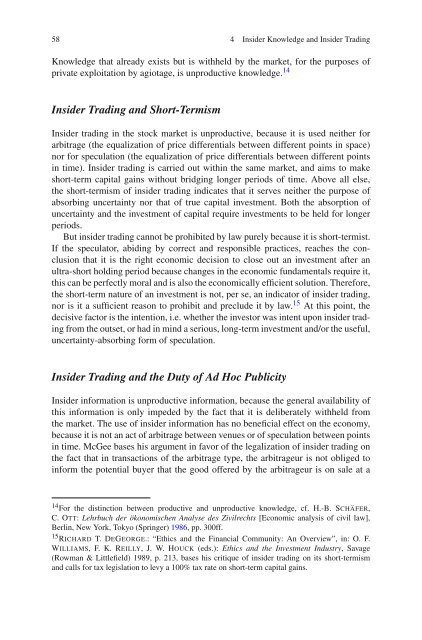The Ethics of Banking: Conclusions from the Financial Crisis (Issues ...
The Ethics of Banking: Conclusions from the Financial Crisis (Issues ...
The Ethics of Banking: Conclusions from the Financial Crisis (Issues ...
You also want an ePaper? Increase the reach of your titles
YUMPU automatically turns print PDFs into web optimized ePapers that Google loves.
58 4 Insider Knowledge and Insider Trading<br />
Knowledge that already exists but is withheld by <strong>the</strong> market, for <strong>the</strong> purposes <strong>of</strong><br />
private exploitation by agiotage, is unproductive knowledge. 14<br />
Insider Trading and Short-Termism<br />
Insider trading in <strong>the</strong> stock market is unproductive, because it is used nei<strong>the</strong>r for<br />
arbitrage (<strong>the</strong> equalization <strong>of</strong> price differentials between different points in space)<br />
nor for speculation (<strong>the</strong> equalization <strong>of</strong> price differentials between different points<br />
in time). Insider trading is carried out within <strong>the</strong> same market, and aims to make<br />
short-term capital gains without bridging longer periods <strong>of</strong> time. Above all else,<br />
<strong>the</strong> short-termism <strong>of</strong> insider trading indicates that it serves nei<strong>the</strong>r <strong>the</strong> purpose <strong>of</strong><br />
absorbing uncertainty nor that <strong>of</strong> true capital investment. Both <strong>the</strong> absorption <strong>of</strong><br />
uncertainty and <strong>the</strong> investment <strong>of</strong> capital require investments to be held for longer<br />
periods.<br />
But insider trading cannot be prohibited by law purely because it is short-termist.<br />
If <strong>the</strong> speculator, abiding by correct and responsible practices, reaches <strong>the</strong> conclusion<br />
that it is <strong>the</strong> right economic decision to close out an investment after an<br />
ultra-short holding period because changes in <strong>the</strong> economic fundamentals require it,<br />
this can be perfectly moral and is also <strong>the</strong> economically efficient solution. <strong>The</strong>refore,<br />
<strong>the</strong> short-term nature <strong>of</strong> an investment is not, per se, an indicator <strong>of</strong> insider trading,<br />
nor is it a sufficient reason to prohibit and preclude it by law. 15 At this point, <strong>the</strong><br />
decisive factor is <strong>the</strong> intention, i.e. whe<strong>the</strong>r <strong>the</strong> investor was intent upon insider trading<br />
<strong>from</strong> <strong>the</strong> outset, or had in mind a serious, long-term investment and/or <strong>the</strong> useful,<br />
uncertainty-absorbing form <strong>of</strong> speculation.<br />
Insider Trading and <strong>the</strong> Duty <strong>of</strong> Ad Hoc Publicity<br />
Insider information is unproductive information, because <strong>the</strong> general availability <strong>of</strong><br />
this information is only impeded by <strong>the</strong> fact that it is deliberately withheld <strong>from</strong><br />
<strong>the</strong> market. <strong>The</strong> use <strong>of</strong> insider information has no beneficial effect on <strong>the</strong> economy,<br />
because it is not an act <strong>of</strong> arbitrage between venues or <strong>of</strong> speculation between points<br />
in time. McGee bases his argument in favor <strong>of</strong> <strong>the</strong> legalization <strong>of</strong> insider trading on<br />
<strong>the</strong> fact that in transactions <strong>of</strong> <strong>the</strong> arbitrage type, <strong>the</strong> arbitrageur is not obliged to<br />
inform <strong>the</strong> potential buyer that <strong>the</strong> good <strong>of</strong>fered by <strong>the</strong> arbitrageur is on sale at a<br />
14 For <strong>the</strong> distinction between productive and unproductive knowledge, cf. H.-B. SCHÄFER,<br />
C. OTT: Lehrbuch der ökonomischen Analyse des Zivilrechts [Economic analysis <strong>of</strong> civil law],<br />
Berlin, New York, Tokyo (Springer) 1986, pp. 300ff.<br />
15 RICHARD T. DEGEORGE.: “<strong>Ethics</strong> and <strong>the</strong> <strong>Financial</strong> Community: An Overview”, in: O. F.<br />
WILLIAMS, F.K.REILLY, J.W.HOUCK (eds.): <strong>Ethics</strong> and <strong>the</strong> Investment Industry, Savage<br />
(Rowman & Littlefield) 1989, p. 213, bases his critique <strong>of</strong> insider trading on its short-termism<br />
and calls for tax legislation to levy a 100% tax rate on short-term capital gains.

















